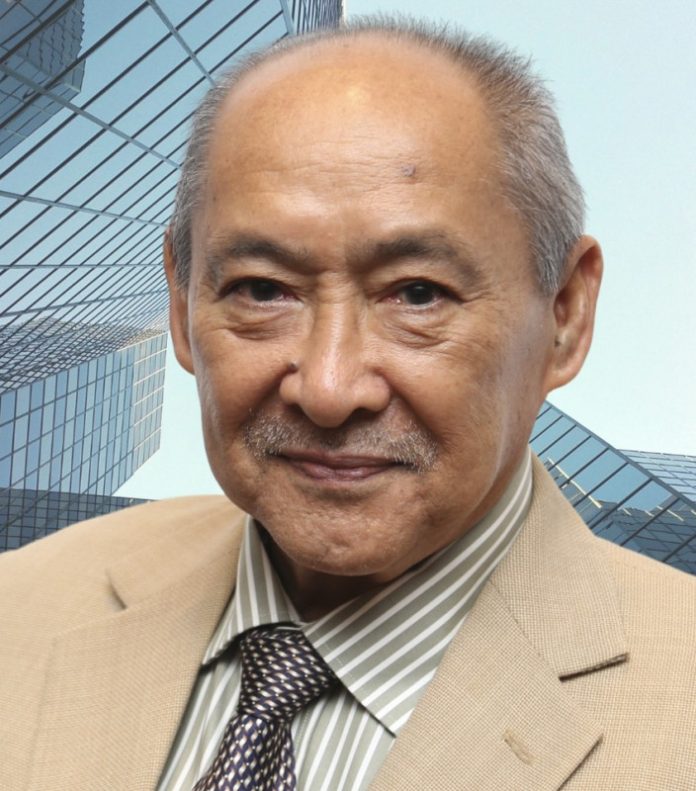By Datuk Ts Dr. Hj Ramli Amir, former President of the Chartered Institute of Logistics and Transport (CILT) Malaysia and Vice-President of CILT International for Southeast Asia
KOTA KINABALU: Democracy, they say, is not just built on the clamour of elections or speeches from gilded podiums. It lives in the quiet details of systems that serve the people: the roads under tyres, the railways that cross cities, and the networks that move goods, dreams, and lives.
In Sabah, however, the pulse of democracy beats faintly amid crumbling highways, underfunded logistics corridors, and shelved dreams of public transport systems like the Light Rail Transit (LRT) and the Bus Rapid Transit (BRT). Indeed, here, far from the towers of Putrajaya, democracy hasn’t died with a bang but with bureaucratic whispers and budgetary omissions, laid to rest beneath the asphalt that was never poured.
A Promise Faded in Practice
When Sabah joined the Malaysian federation through the Malaysia Agreement 1963 (MA63), it did so under the shared belief that this was a partnership of equals.
MA63 was the foundation stone for a democracy built across sea and soil, a document not of concession, but of covenant. Yet, as years turned into decades, that vision has become a footnote rather than a framework.
The logistics landscape of Sabah is the physical geography of that forgotten ideal. It speaks not just of potholes and poor connectivity, but of a democratic commitment that eroded, kilometre by neglected kilometre.
Transport systems are often referred to as the arteries of a nation.
By that metaphor, Sabah’s arteries have been left to calcify. Proposals to modernise its transport infrastructure, to restore the flow of commerce, to connect the rural to the urban and the state to the world, have routinely been denied or delayed, not due to lack of necessity, but because federal eyes see through a lens polished only by profit margins and numbers in ledgers.
Economic justification becomes the scalpel used to surgically remove socio-economic aspirations. The state sees life, the federal sees ledgers. And so, nothing moves forward.
The LRT that Never Left the Station
Take, for instance, the LRT proposal for Kota Kinabalu, a project that, had it materialised, would not only have transformed the city’s mobility but would have signalled Sabah’s arrival onto the modern stage.
From the state’s perspective, this was justified by the long-term gains: reduced congestion, job creation, business stimulation, and improving the quality of life.
But at the federal level, the calculus was colder: insufficient economic returns in the short term. Not viable on paper. Denied.
Each rejection is not merely a policy decision. It is a small act of erasure.
Sabah’s hopes, its rights, its vision for equitable development, quietly voided by a system whose heart no longer beats in tandem with its eastern partner. What emerges is not cooperation, but condescension. The LRT is not just a rail system; it is a metaphor for autonomy stalled at a red signal.
Forks in the Road: Who Truly Steers the Wheel?
When infrastructure decisions for Sabah are made thousands of miles away by those whose experience of the state is perhaps limited to brief visits or filtered reports, the democratic compass falters.
Democracy is not just held in elections, but in the right to shape destinies according to local truths. If a community identifies a need, builds its case, and drafts its aspiration, only for it to be vetoed by distant guardians of centralised reason then surely, we must ask: Who holds the steering wheel, and for whom does the road unroll?
The baseline contradiction is philosophical. Where Sabah sees development through a socio-economic lens, the federal system often sees it through narrow economic optics. But democracy thrives in nuance, not in figures alone.
Sometimes, highways must be built not because they are immediately profitable, but because they connect futures. Sometimes a rail line is more than transit, it is a message that says, you matter.
Democracy by Design—or by Default?
The irony is heavy: smaller, sovereign nations with fewer resources have executed modern public transport systems not because of their financial might, but because they chose to believe in broad-based development.
They chose to interpret infrastructure not as ledger lines but as lifelines. Sabah, rich in resources and promise, remains shackled not by lack of vision, but by systems unwilling to decentralise, to listen, or to defer. The denial of development becomes a quiet disenfranchisement, less overt than a stolen vote, but no less damaging.
This is why the phrase death of democracy might seem intense but fitting. Not because we are witnessing institutional collapse in Sabah, but because the spirit of democratic federalism is being stifled. The ritual of consultation exists, but the substance of shared governance wanes. Felled not by revolution, but by refusal.
Rekindling the Flame on Borneo’s Eastern Horizon
What Sabah asks is not charity, but justice. Not privilege, but parity. To live the full measure of democracy promised in 1963 means recognising that development is not a favour, it is a right long earned and long delayed. The logistics landscape in Sabah is ready to be transformed, not incrementally, but boldly. With modular ports, integrated transport corridors, modern public transit, and digitally smart logistics systems that serve both its people and its geopolitical potential.
But none of that can happen if approval continues to be held hostage by those detached from Sabah’s lived reality. If MA63 is to mean anything more than ceremonial rhetoric, its spirit must be reflected not just in speeches but in strategic budgets, deliberate policies, and collaborative governance.
Epilogue—A Call to Sabah’s Future Custodians
So perhaps democracy hasn’t died outright in Sabah, but it slumbers, shallow breathing, waiting to be awakened—not by slogans or ceremonial visits from distant capitals, but by the persistent insistence of Sabahans themselves. For too long, patience has been mistaken for acquiescence and resolve for resignation. Yet beneath the silence of unbuilt railways and the slow grind of under-resourced logistics, there is a quiet strength—a pulse that waits to quicken into action.
The promise made in 1963 may be unfulfilled, but it is not forgotten. What Sabahans must remember, even in moments of doubt, is that the power to shape destiny does not wholly reside in Putrajaya’s offices, nor is it secured merely by another round of empty assurances.
The true guardians of Sabah’s future are her people. Each citizen, each community, each leader who raises their voice, plans their village’s path forward, or refuses to let their children’s dreams be defined by the limits of a disinterested bureaucracy, keeps that promise alive.
The unfinished roads, the missing trains, and the stalled corridors are not only marks of broken commitments; they are invitations—urgent calls to reclaim agency. Let this quiet funeral not be the closing chapter, but the gathering dawn before renewal. Let the silence be pierced by new questions, asked louder and more united than before: If not now, then when? If not us, then who?
Awakening the spirit of democracy means demanding more than gestures. It means holding every promise against the light, demanding transparency in every deal, and refusing to settle for development as an afterthought. It means voting with intention, advocating with courage, and imagining a Sabah that does not simply wait for progress, but insists upon it.
The true measure of democracy is not in the hand that gives, but in the community that stands tall and refuses to be overlooked. The South China Sea may separate Sabah from federal halls, but it cannot muffle the voices that speak with conviction and unity. Every step towards better logistics, every push for integrated systems, every effort to resurrect the spirit of the Malaysia Agreement is a step toward dignity restored—not just for us, but for generations who will read tomorrow’s history.
Sabah’s narrative is not confined to the margins of federal policy. It is a central chapter in the Malaysian story—one whose arc must now bend, not by the will of distant authorities, but by the collective courage of those whose lives most depend on its happy resolution. The promise awaits. Sabahans, let it be you who finally bring it home.


